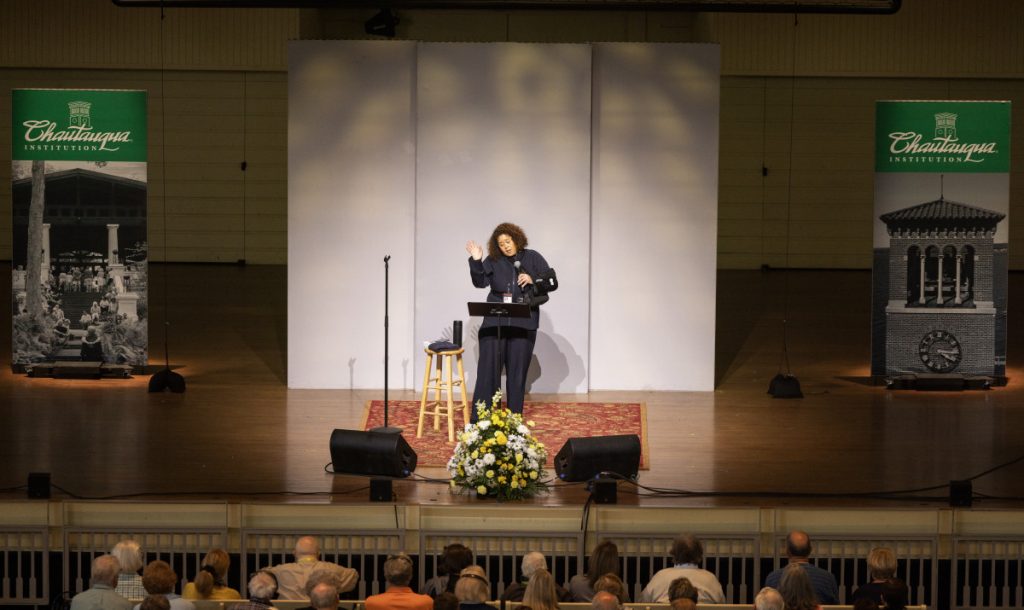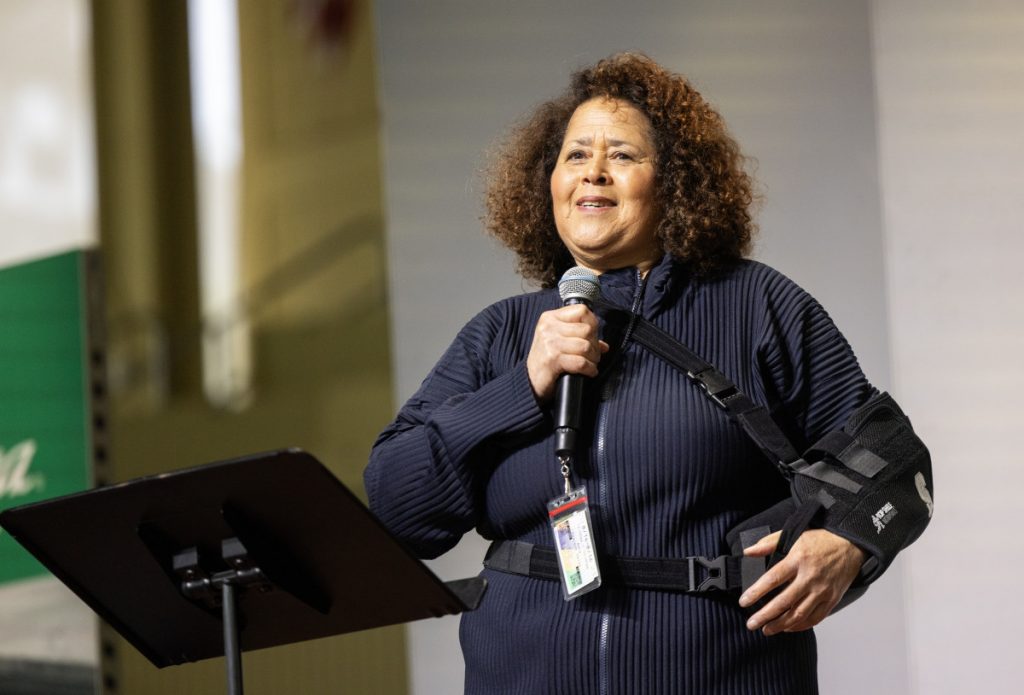
Alton Northup
Staff writer
To understand America, Anna Deavere Smith becomes it.
For the last 10 years, she has interviewed hundreds of vulnerable children – including students at Western High School, a predominantly Black all-girls school in Baltimore, where Smith graduated. She has turned these interviews — exercises in finding belonging and understanding expression — into a one-woman play titled Pipeline Girls. The performance follows a long line of projects since her early 1980s one-woman show, On the Road: A Search for American Character.
“My grandfather would say, ‘If you say a word often enough it becomes you,’ ” she said. “I’ve been trying to become America.”
Smith, a playwright, actor, and a recipient of the National Humanities Medal and selection for the Jefferson Lecture, the U.S. government’s highest honor for achievement in the humanities, discussed what expression means to her through a mix of lecture and performance titled “The Work of Democracy: Freedom of Expression” at 10:45 a.m. Tuesday in the Amphitheater. She continued the Chautauqua Lecture Series Week Eight theme, “Freedom of Expression, Imagination, and the Resilience of Democracy.” She’s made several appearances on Chautauqua’s platforms in the past; her most recent was a virtual presentation for the Chautauqua Lecture Series in 2020, via CHQ Assembly, during a week on “Art and Democracy.”
Smith opened with a lesson of “performance as a way of knowing,” which she learned only days ago from Akira Smith, a recent graduate of Western High School. Titled Women’s Empowerment Show, Smith reenacted her interview with Akira Smith.
“Honestly, I really feel like I got here by just falling. Like, I felt like it’s the most realistic answer I could give – by falling, it’s like feeling like I was at my lowest numerous points of times,” Smith spoke as Akira, a breathy teenager. “Once you really hit that place in your life, and especially when it’s for a long time, you just feel like things keep going bad, bad, bad and bad. And I feel like once you get that one spark of life, like life, that one spark of life, like you never want to lose it … and I feel like the biggest fall for me was from 7 to 9 years old.”
Akira Smith’s father was killed when she was only 1 year old, though she grew up believing someone else was her father. When she was 7 years old, she was placed in the care of her great-grandmother after her mother lost custody.
“I had nothing but good time with her; I had nothing but a positive image of her so, you know, to get taken from her and everybody did nothing but bash her – it was kinda like, ‘Do y’all expect me to kinda just turn my back on my mom?’ ” Smith pleaded, in character as Akira. “If y’all say she crazy, if she had me, maybe she wouldn’t be. Because at the end of the day, it’s kinda like you need that light, and I feel like I was that light.”

Akira Smith’s mother had stayed in a psychiatric hospital, and she ultimately lived on the streets.
“At 7 years old, she would rather be homeless and be with her mother who needed her,” Smith said. “As sad as it is, the sense of being needed itself was a part of what gives her her ambition and her drive.”
Akira Smith said she could not see the light again until she was 14 years old, when she stumbled upon a dance group performing a women’s empowerment dance.
“Like the music came on; the lights were dark; they were in all brown and I remember they were just sitting here, there was four of them like in a circle, and then it just went from like small movements and like it expanded, something abstract, something big,” Smith reflected on the dance as Akira. “It was kinda like watching them move literally from the emotion on their face, the movement in their bodies, the contrasting, and it was just like a lot in that moment. A lot of people were in there crying; it makes you take that breath and you’re like wow – I literally understood everything you just told me in the dance.”
Many of the students Smith interviewed are not performing art students. In fact, they have been shut out from the prestigious conservatories and institutions where she worked. But Akira Smith’s reaction to the performance affirms for Smith the importance of the arts for young people.
As important as the humanities are, theater companies across the country are struggling financially, Smith said. Many are canceling entire seasons or staging fewer shows. While theaters can adapt new business models, she said it will take more to address a second crisis: The crisis of expression.
“We, the people who say that we can open your hearts to feelings you may not know you have, we ourselves have become afraid of feeling and afraid of expression,” she said.
She decried the implementation of trigger warnings, which warn audiences about potentially distressing subjects in a performance. She is particularly alarmed by its effect on the speaking art form, where people may worry about saying the wrong thing.
In preparing her staff before their travels to Baltimore, she told them: “You will say the wrong thing. You can only say the wrong thing, so just learn how to say sorry.”
If saying the wrong thing shuts people down and takes away courage, then speaking artists cannot do their work, she said. It requires places of goodwill.
Perhaps the most infamous act of goodwill between two artists was James Baldwin and Margaret Mead’s 1970 discussion on race and society titled “A Rap on Race.” In closing her lecture, Smith reenacted 20 minutes of that seven-and-a-half hour conversation between the two, who were living outside the United States at the time.
At times their exchange grew heated, which Smith demonstrated through channeling the voices of both personalities. Baldwin and Mead disagreed on identifying with the term exile, which Baldwin embraced due to the racial segregation in the United States. Nevertheless, the two came to an agreement on what mattered most to them.
“But what should we do about the children?” Smith asked as Baldwin in ending her performance. “You have to assume that we’re responsible for the future of this world.”




